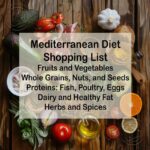The Key to Sustainable Eating
In today’s world, where health, vitality, and environmental sustainability are more interconnected than ever, the concept of sustainable eating is gaining unprecedented momentum.
Sustainable diets are about more than just eating green; they represent a comprehensive approach that combines nutritional benefits with long-term environmental care and cultural relevance.
These diets are designed to promote optimal health and well-being, while also reducing our carbon footprint and supporting the global ecosystem.
By focusing on whole foods, reducing processed food intake, and considering the source and production methods of our food, sustainable eating offers a path to not only improve our own health but also contribute positively to the world around us.
Discovering Sustainable Diet Plans
Navigating the landscape of diet plans can be overwhelming, but sustainable diets stand out for their holistic approach to health and the environment.
Each plan, with its unique focus and principles, caters to different preferences and lifestyle needs while sharing a common goal: to promote longevity, well-being, and environmental sustainability.
Let’s explore the most acclaimed sustainable diet plans, characterized by their emphasis on whole foods, balanced nutrition, and mindful eating.
Is Mediterranean Diet Expensive?
Discover the secrets of the Mediterranean diet in "Is the Mediterranean Expensive?" This article explores the affordability of this renowned…
1. Mediterranean Diet: A Heart-Healthy Choice
The Mediterranean diet draws inspiration from the dietary patterns of Greece, Italy, and Spain, regions known for their high life expectancy and low rates of chronic disease.
This diet is rich in:
- Fruits and vegetables: A rainbow of nutrients and antioxidants.
- Whole grains: Fiber-rich and heart-healthy.
- Legumes: Plant-based proteins and fiber.
- Nuts and seeds: Sources of healthy fats and proteins.
- Olive oil: The primary source of fat, rich in monounsaturated fatty acids.
Moderate amounts of fish and poultry are included, making it a balanced approach that supports heart health and helps manage blood sugar levels.
The Mediterranean diet emphasizes the joy of eating and encourages meals to be enjoyed socially, contributing to overall satisfaction and well-being.
2. DASH Diet: Managing Blood Pressure Naturally
The Dietary Approaches to Stop Hypertension (DASH) diet is a scientifically proven method to lower blood pressure naturally, without the strict reliance on medication.
Its key components include:
- Fruits and vegetables: Loaded with potassium, magnesium, and fiber.
- Whole grains: For heart health and sustained energy.
- Low-fat dairy: Sources of calcium and protein.
- Lean meats, fish, and poultry: High-quality protein with reduced fat.
This diet plan reduces the intake of saturated fats, trans fats, and cholesterol, focusing on nutrient-dense foods to support cardiovascular health.
The DASH diet is flexible and easy to follow, making it adaptable to a variety of dietary preferences and cultural traditions.
Are you an athlete looking for a healthy and nutritious diet that will help you perform at your best? If…
3. Flexitarian Diet: Flexibility in Eating
The Flexitarian diet is a semi-vegetarian approach that encourages mostly plant-based foods while allowing meat and other animal products in moderation.
It stands out for its flexibility and inclusiveness, promoting:
- A high intake of fruits, vegetables, and whole grains for fiber and nutrients.
- Plant-based proteins from legumes and nuts.
- Occasional meat and fish for those who do not want to commit to full vegetarianism.
This approach supports gut health and weight management, and it’s associated with a lower risk of chronic diseases.
It emphasizes the importance of variety and moderation, making it a sustainable and adaptable diet plan for many.
4. Nordic Diet: Embracing Local and Seasonal Foods
Originating from countries like Denmark, Finland, Norway, Sweden, and Iceland, the Nordic diet focuses on the consumption of foods that are local, seasonal, and sustainable.
Its staples include:
- Berries and fruits: Especially those that are native to the Nordic regions.
- Root vegetables: A cornerstone of traditional Nordic cooking.
- Fatty fish: Such as salmon, mackerel, and herring, rich in omega-3 fatty acids.
- Whole grains: Particularly barley, oats, and rye.
- Legumes: For plant-based protein.
This diet is not only beneficial for heart health and cognitive function but also emphasizes the environmental aspect of eating, promoting food sustainability and reducing carbon footprint.
Mediterranean Diet Shopping List
Explore the Mediterranean Shopping List and embark on a culinary journey that not only tantalizes your taste buds but also…
5. MIND Diet: Diet for Brain Health
The MIND diet, short for Mediterranean-DASH Intervention for Neurodegenerative Delay, is a fusion of the Mediterranean and DASH diets with a special emphasis on foods that support brain health.
Key components of the MIND diet include:
- Leafy green vegetables: Rich in vitamins and minerals associated with brain health.
- Berries: Particularly blueberries, known for their cognitive benefits.
- Nuts: For healthy fats and proteins.
- Whole grains: A staple for energy and overall health.
- Fish: Encouraged at least once a week for omega-3 fatty acids.
By focusing on these food groups, the MIND diet aims to reduce the risk of Alzheimer’s disease and other forms of dementia, offering a dietary approach that supports both cognitive and cardiovascular health.
Nutritional Foundations for Longevity
The cornerstone of sustainable diets lies in their ability to not only promote long-term health but also ensure the protection of our environment.
These diets are rooted in nutritional science and focus on the consumption of whole foods, plant-based nutrition, and a balanced intake of protein and healthy fats.
This approach is designed to reduce the risk of chronic diseases, support mental and physical well-being, and enhance longevity.
Whole Foods and Plant-Based Nutrition
The emphasis on whole foods and plant-based nutrition is paramount in sustainable diets.
This nutritional foundation is built on:
- Fruits and Vegetables: Essential sources of vitamins, minerals, and antioxidants that support immune function and reduce inflammation.
- Whole Grains: Provide sustained energy, improve digestive health, and are linked to a lower risk of several diseases including heart disease, type 2 diabetes, and certain cancers.
- Legumes: Excellent sources of plant-based protein, fiber, and nutrients such as iron and zinc.
Incorporating a variety of these foods ensures a broad intake of essential nutrients, promoting a balanced diet and supporting overall health.
Protein and Healthy Fats in Sustainable Diets
Protein and fats are crucial components of a balanced diet, playing key roles in maintaining health and supporting bodily functions.
- Protein: Necessary for building and repairing tissues, making enzymes and hormones, and supporting immune health. Sustainable sources include:
- Plant-based proteins (legumes, nuts, seeds)
- Lean animal proteins (poultry, fish, dairy)
- Healthy Fats: Important for brain health, energy, and the absorption of certain vitamins. Sources of healthy fats include:
- Monounsaturated and polyunsaturated fats (olive oil, avocados, nuts)
- Omega-3 fatty acids (fatty fish, flaxseeds, walnuts)
Balancing these nutrients within a sustainable diet can contribute to heart health, weight management, and overall well-being.
Integrating Sustainable Diets into Your Lifestyle
Adopting a sustainable diet involves more than just choosing the right foods; it’s about integrating these choices into your lifestyle in a way that is enjoyable, manageable, and beneficial to the environment.
Meal Planning and Preparation Tips
Successful integration of a sustainable diet into daily life requires some planning and preparation.
Here are some tips to make it easier and more enjoyable:
- Plan Ahead: Create a weekly meal plan that incorporates a variety of whole foods and plant-based meals.
- Batch Cook: Prepare meals in bulk to save time and ensure you have healthy options readily available.
- Use Seasonal and Local Ingredients: Support local farmers and reduce your carbon footprint.
Sustainable Eating Habits and Mindfulness
Mindful eating is a key component of sustainable diets, encouraging a deeper connection with food, how it’s produced, and its impact on our health and the environment.
- Listen to Your Body: Pay attention to hunger and fullness cues to avoid overeating.
- Appreciate Your Food: Take time to enjoy the flavors and textures of your meals.
- Understand Food Sources: Choose foods that are ethically produced and environmentally sustainable.
Health Benefits Beyond Weight Loss
While weight management is a common goal, the benefits of adopting a sustainable diet extend far beyond this, touching on various aspects of health and well-being.
Chronic Disease Prevention and Management
Sustainable diets are rich in nutrients and low in processed foods and sugars, contributing to the prevention and management of chronic diseases such as:
- Heart Disease: Diets high in whole grains, fruits, vegetables, and healthy fats can improve heart health.
- Diabetes: A balanced intake of complex carbohydrates and fiber helps regulate blood sugar levels.
- Cognitive Decline: Nutrient-dense diets support brain health and may reduce the risk of dementia.
Environmental and Ethical Benefits of Sustainable Diets
Choosing a sustainable diet also has significant environmental and ethical benefits, including:
- Reduced Carbon Footprint: Plant-based diets require less energy, land, and water to produce.
- Support for Local Economies: Buying local and seasonal foods supports local farmers and reduces transportation emissions.
- Ethical Animal Treatment: Opting for products from ethically raised animals contributes to higher welfare standards.
Conclusion
Embracing a sustainable lifestyle through mindful dietary choices offers a pathway to improved health, environmental conservation, and ethical eating practices.
By prioritizing whole foods, plant-based nutrition, and sustainable food sources, individuals can contribute to their well-being and the health of the planet, fostering a future where both can thrive in harmony.





